Charles E W Bean, Diaries, AWM38 3DRL 606/274/1 - 1918 - 1941 - Part 7
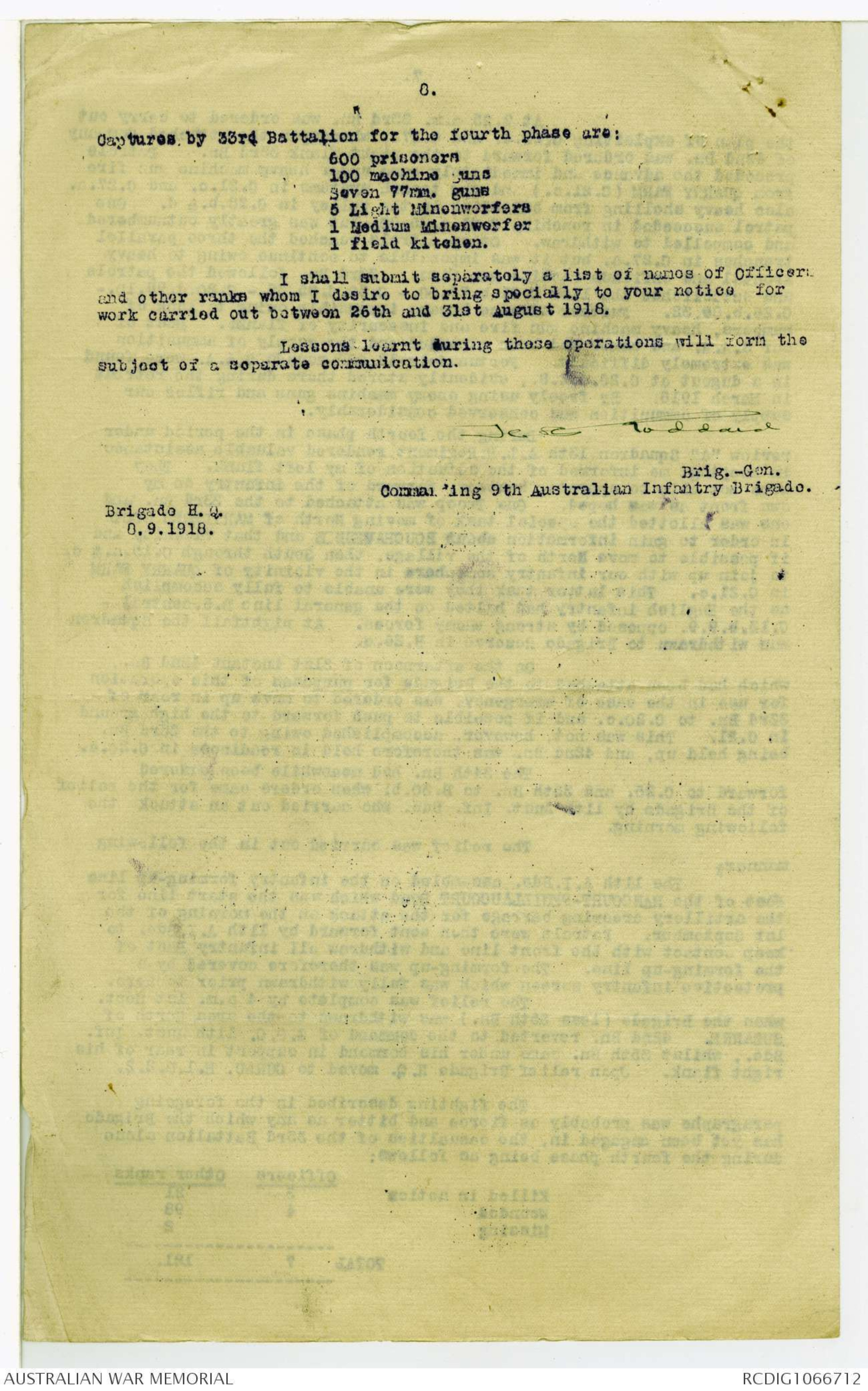
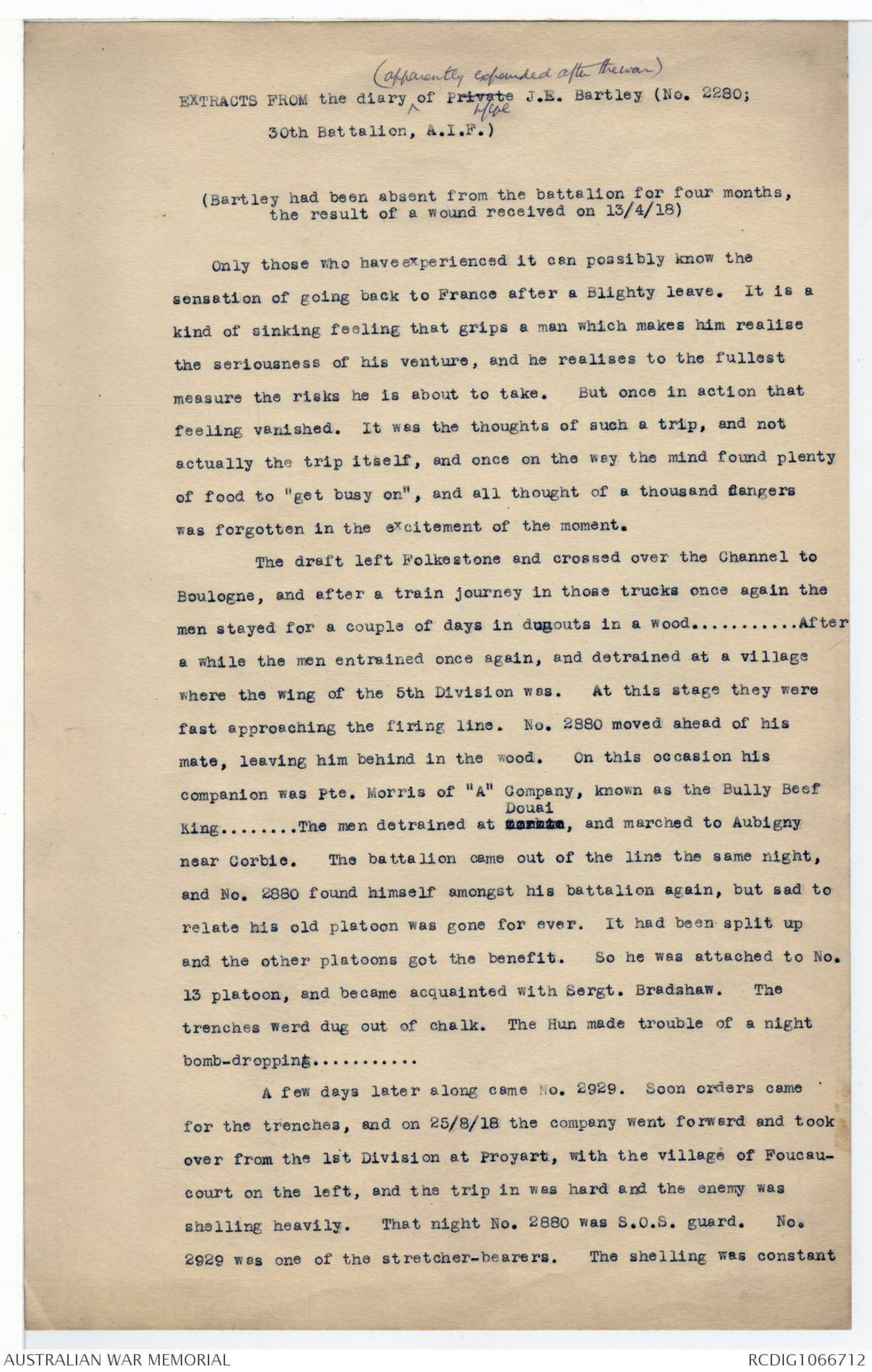
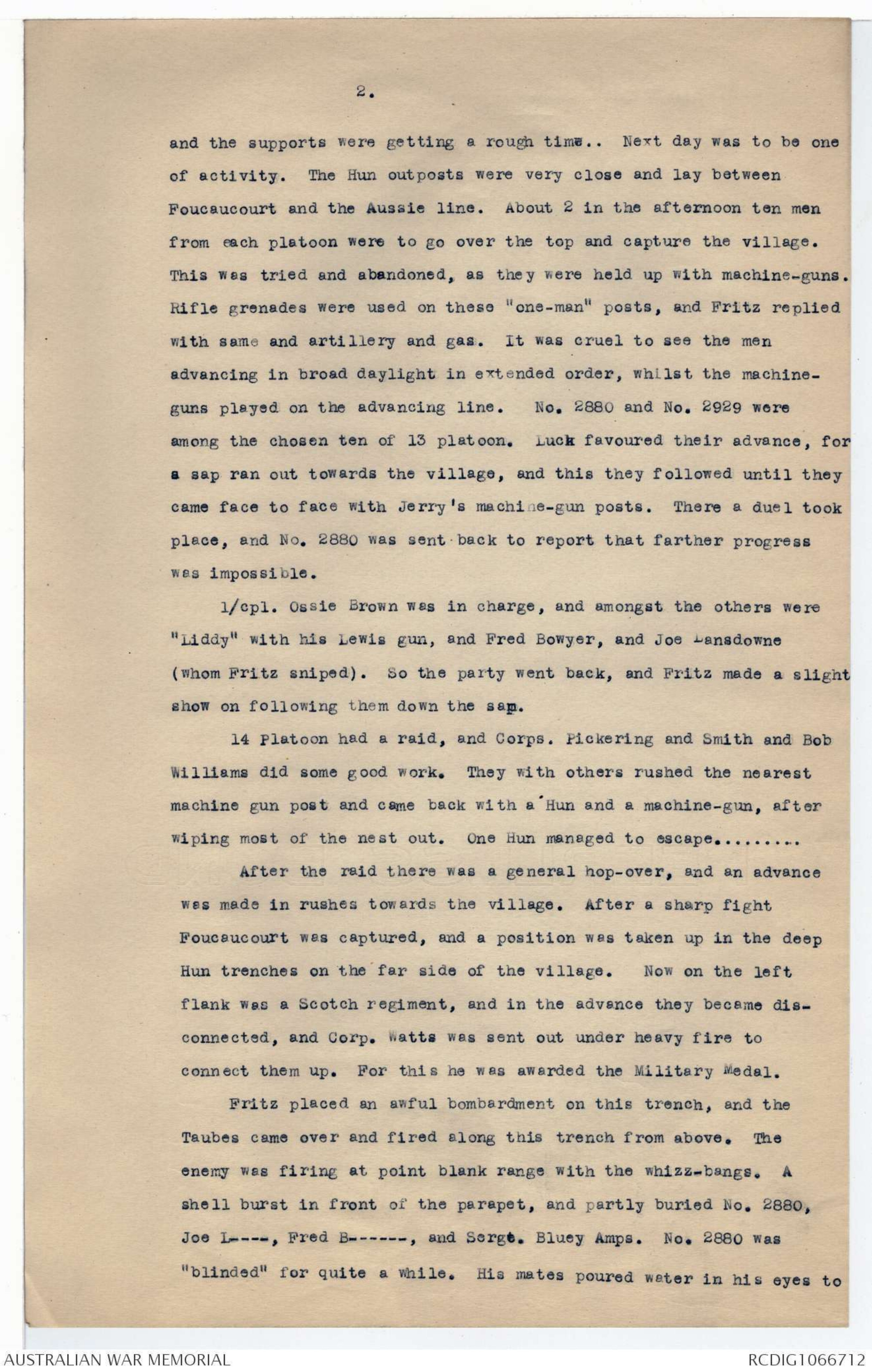
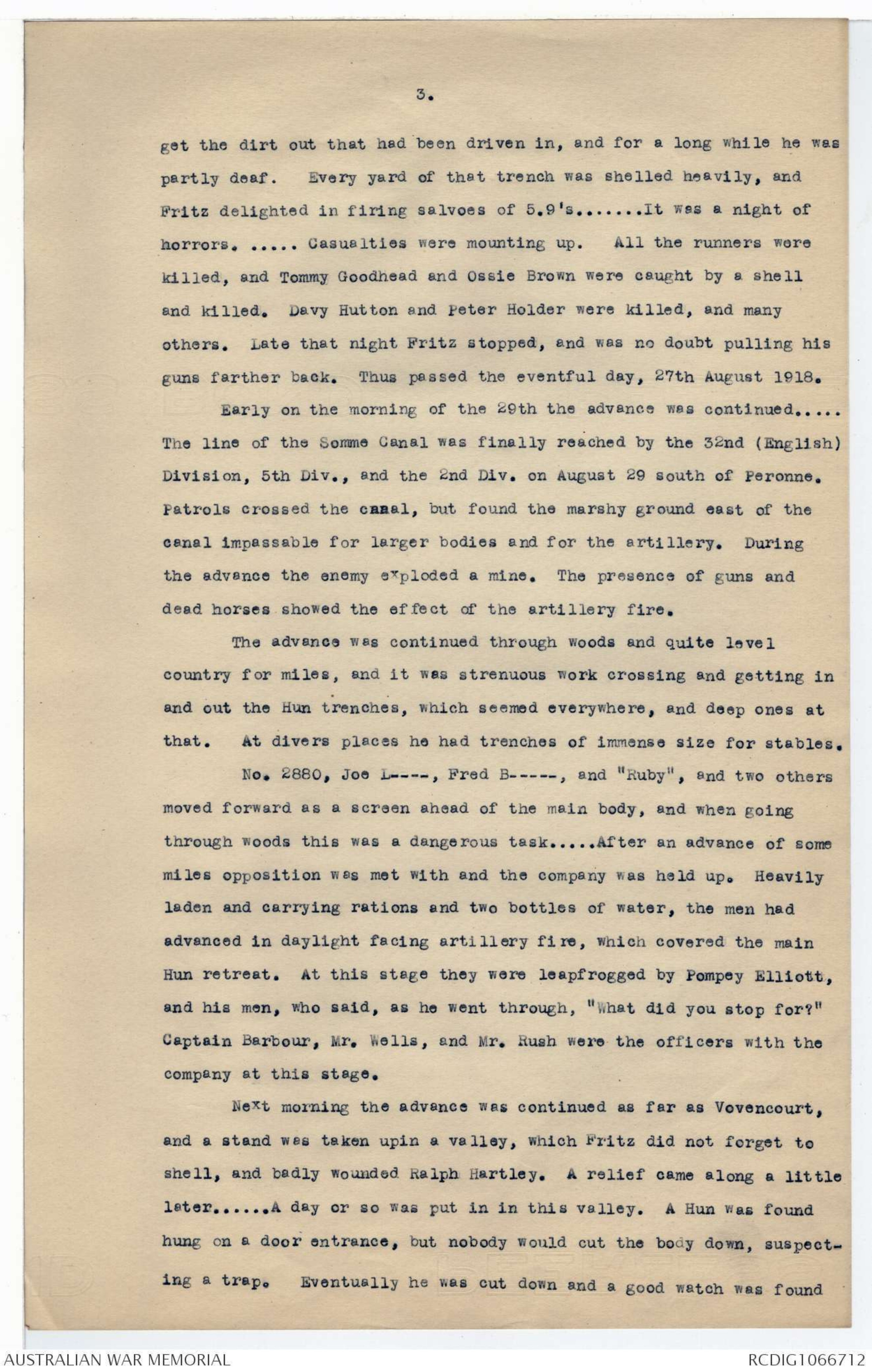
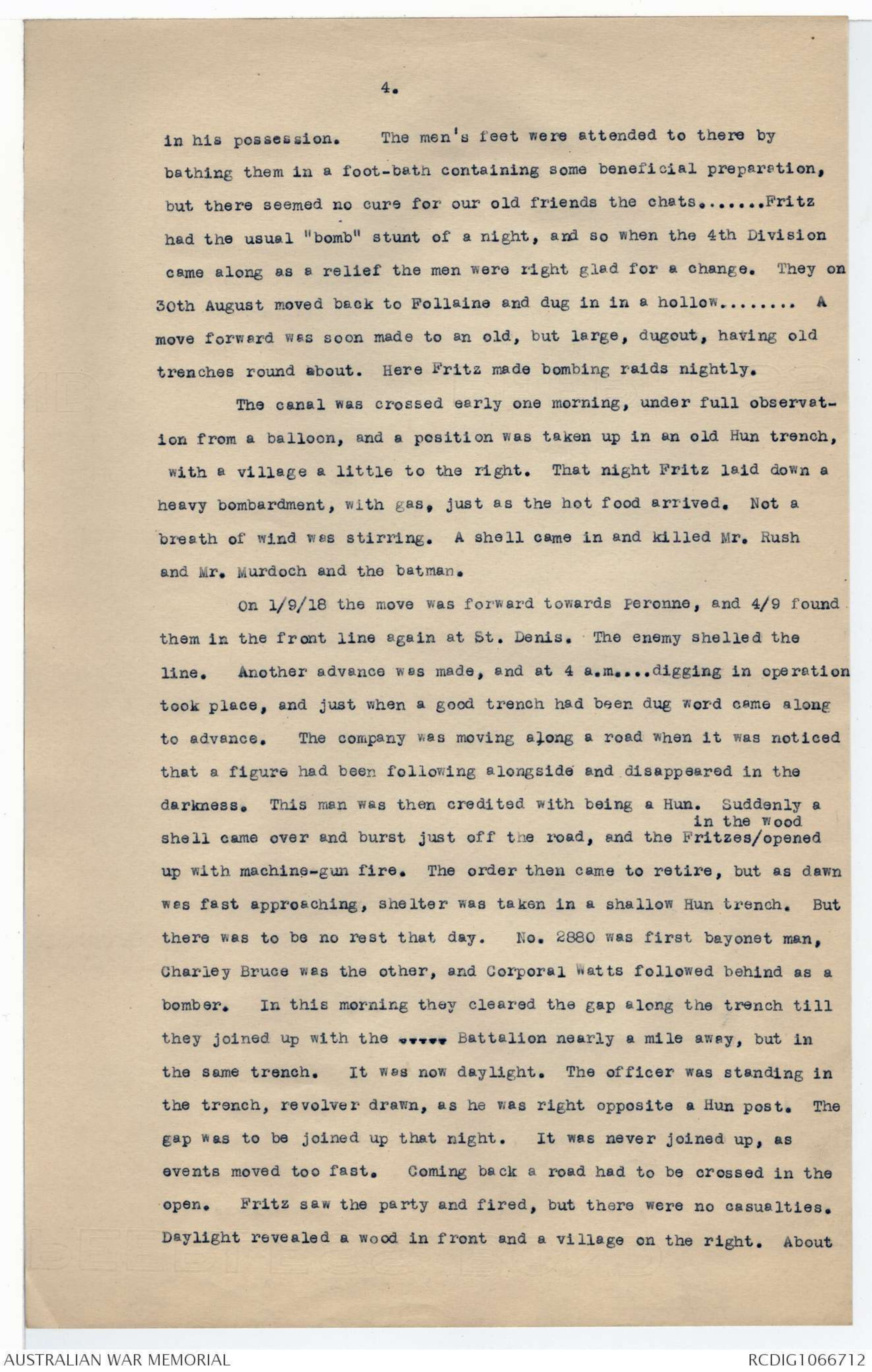
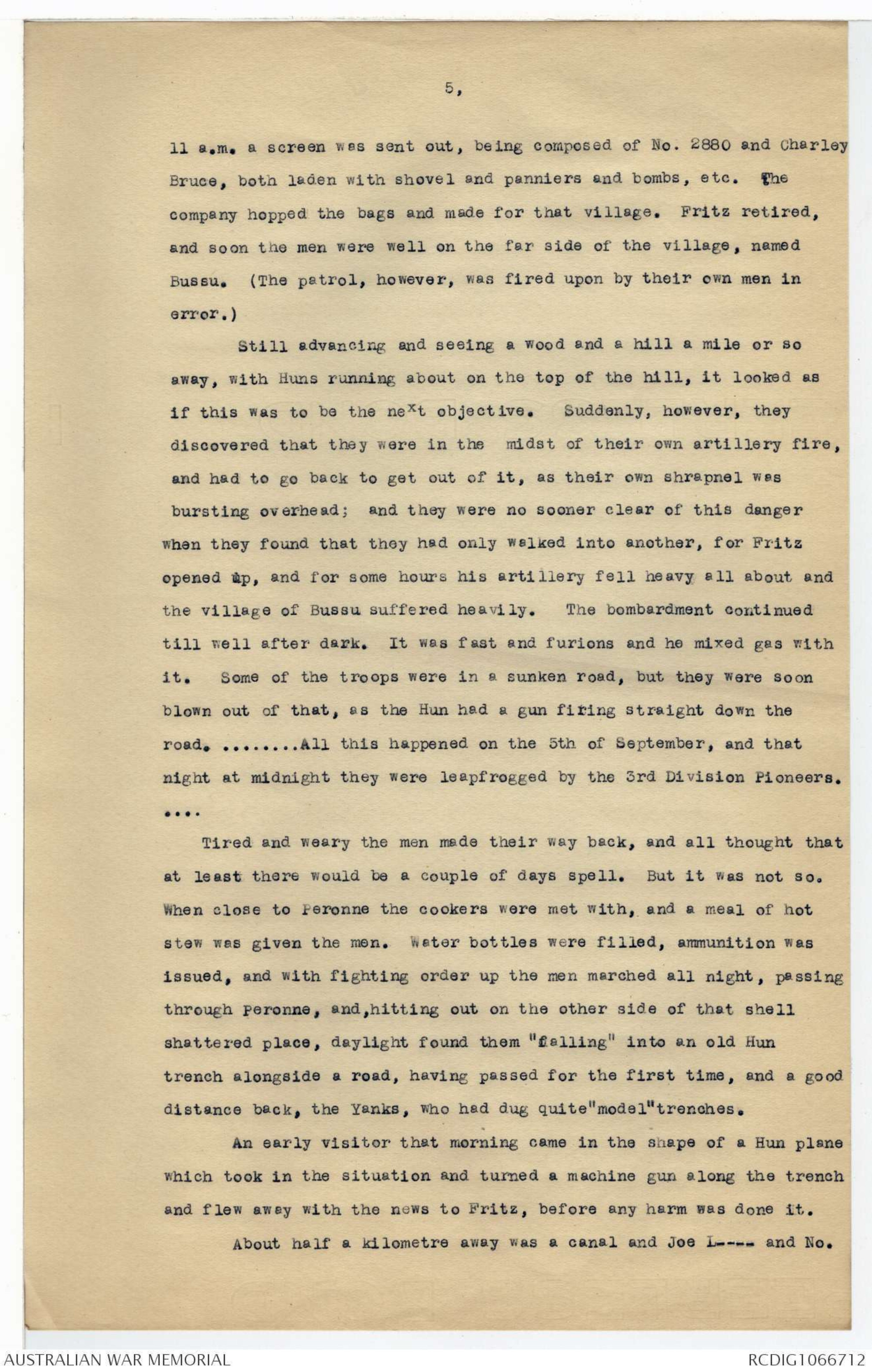
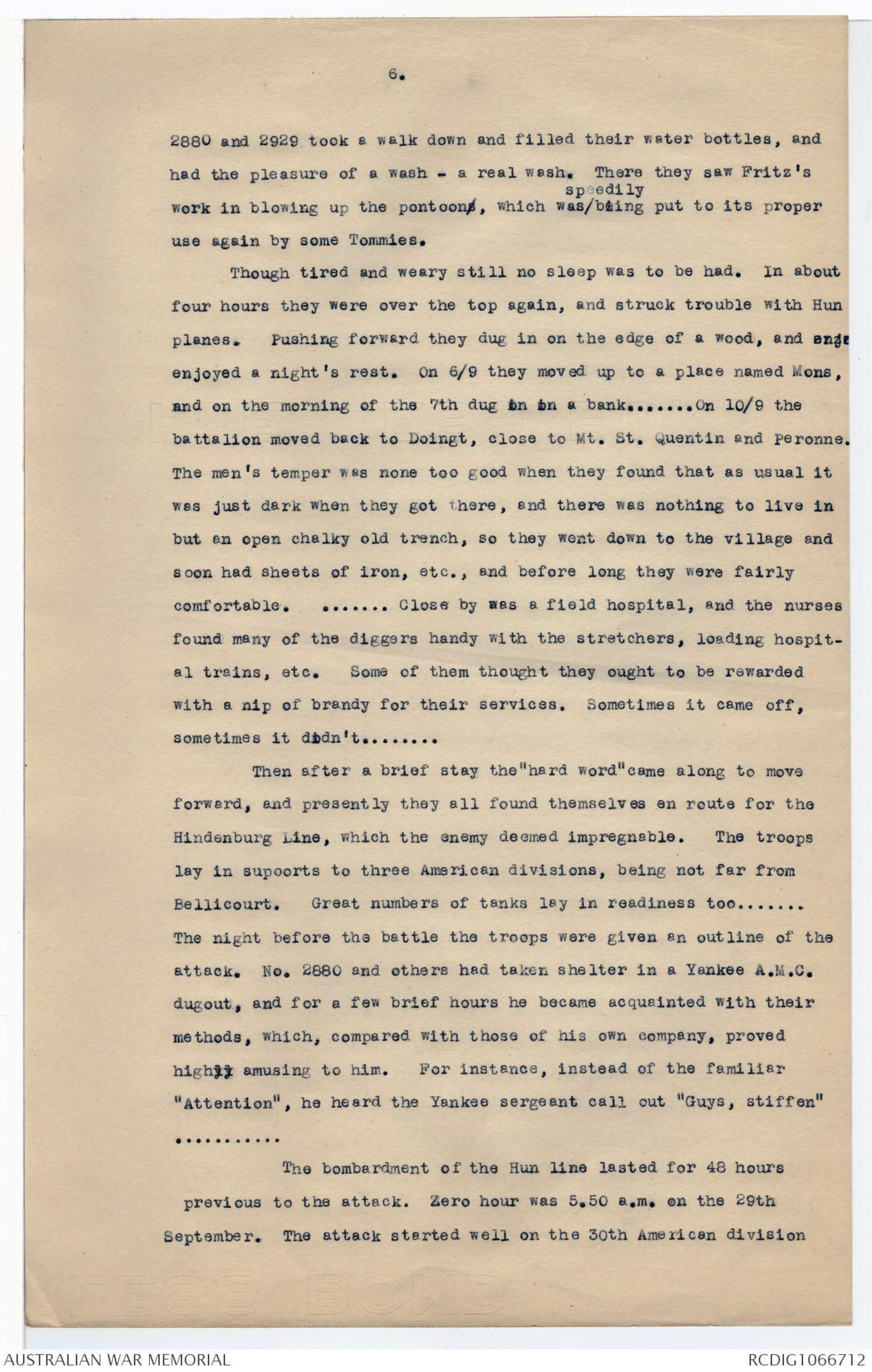
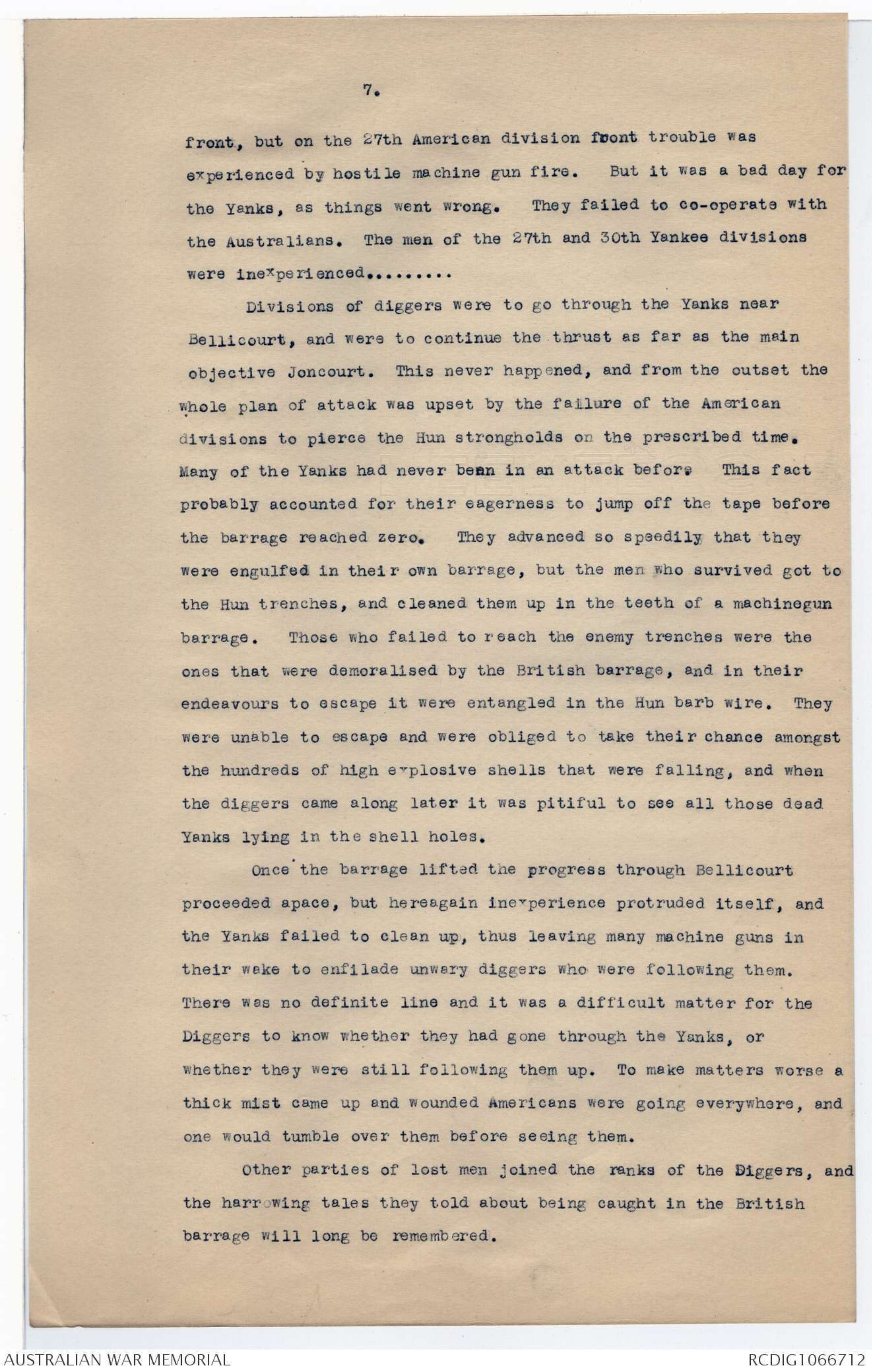
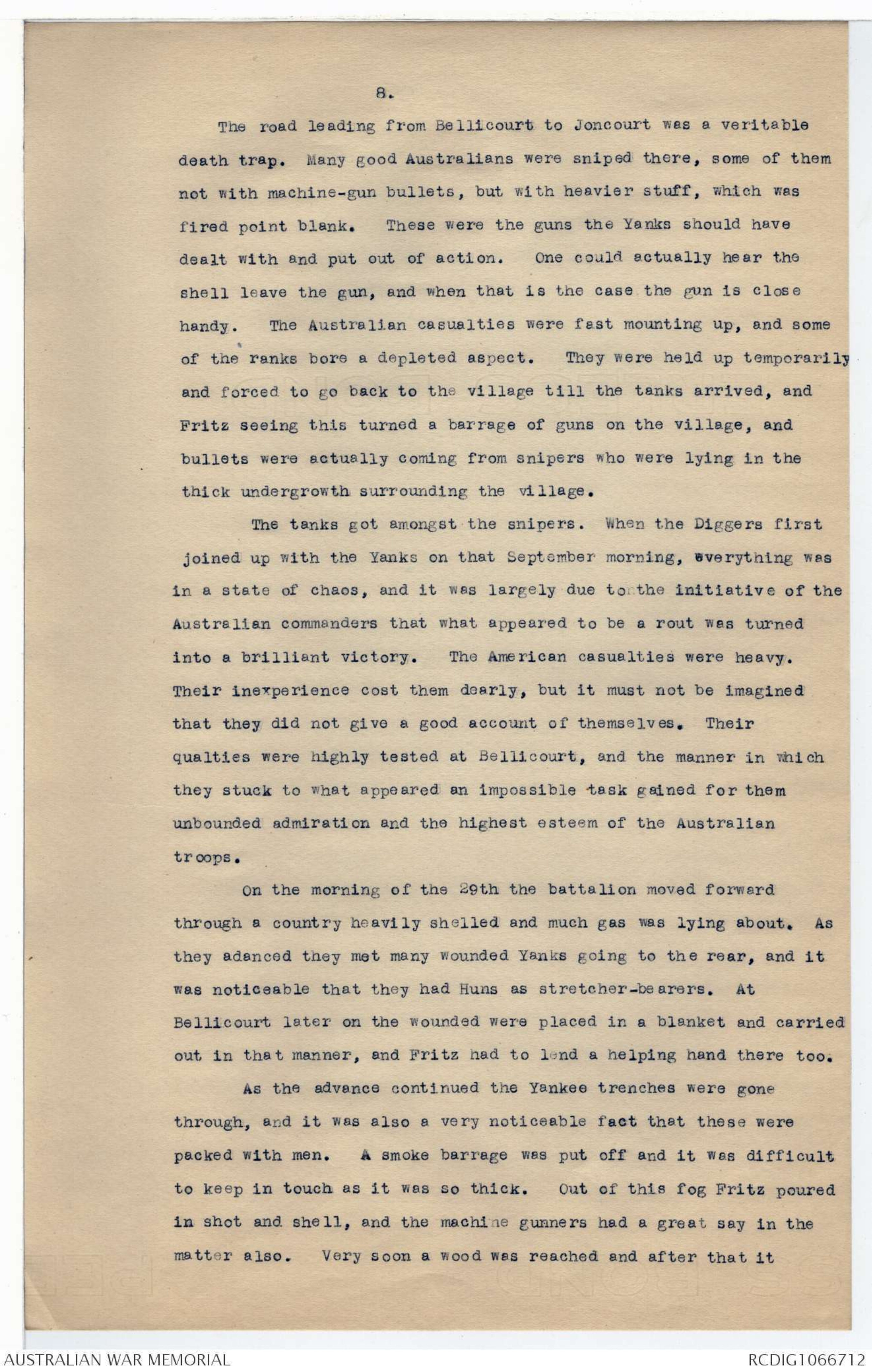
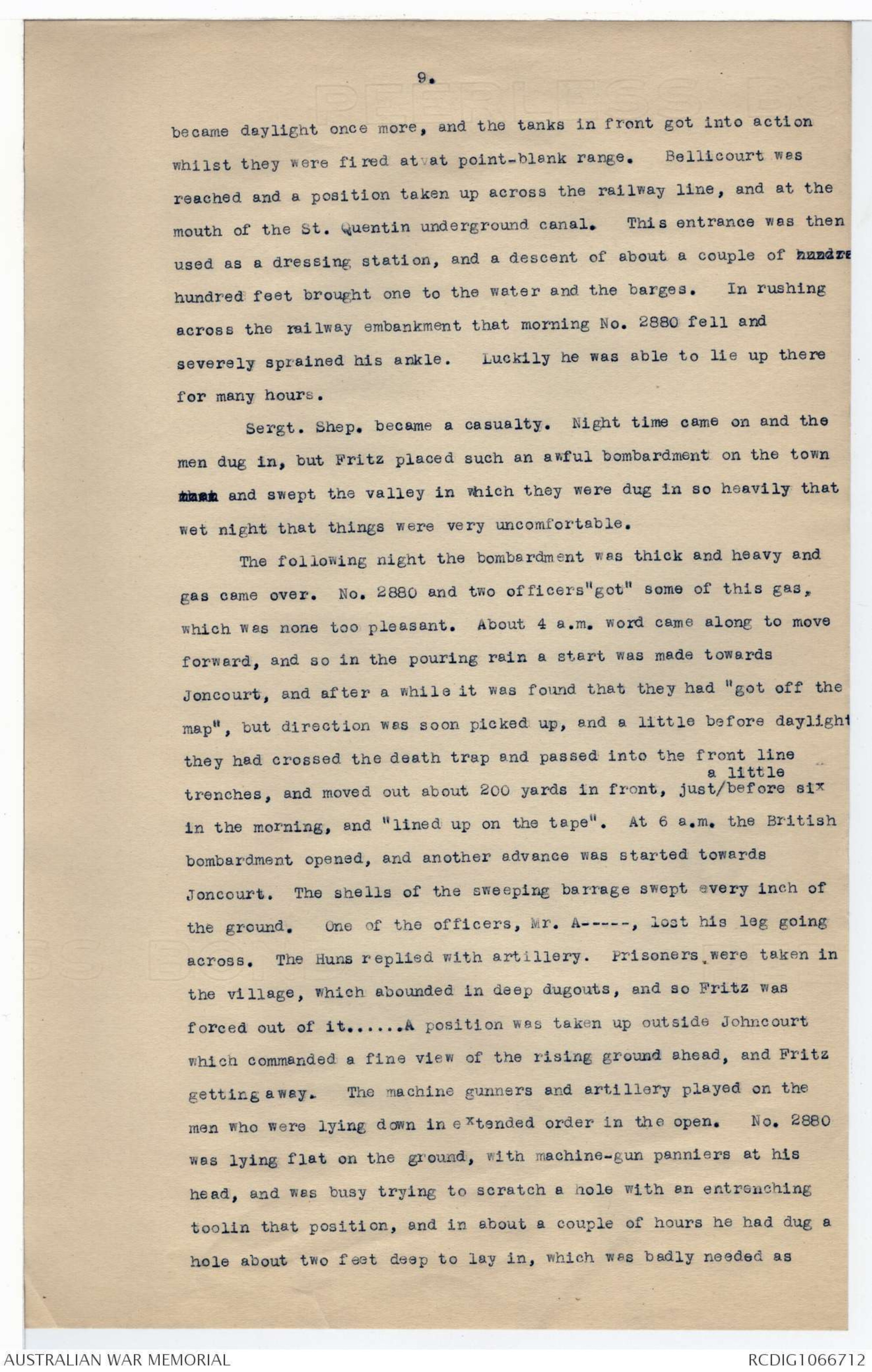
8.
Captures by 33rd Battalion for the fourth phase are:
600 prisoners
100 machine guns
Seven 77mm. guns
5 Light Minenwerfers
1 Medium Minenwerfer
1 field kitchen.
I shall submit separately a list of names of Officers
and other ranks whom I desire to bring specially to your notice for
work carried out between 26th and 31st August 1918.
Lessons learnt during these operations will form the
subject of a separate communication.
H. A. Goddard
Brig.-Gen.
Commanding 9th Australian Infantry Brigade.
Brigade H.Q.
8.9.1918
EXTRACTS FROM the diary ^(apparently expanded after the war) of Private L/Cpl J. E. Bartley (No.2280;
30th Battalion, A.I.F.)
(Bartley had been absent from the battalion for four months,
the result of a wound received on 13/4/18)
Only those who have experienced it can possibly know the
sensation of going back to France after a Blighty leave. It is a
kind of sinking feeling that grips a man which makes him realise
the seriousness of his venture, and he realises to the fullest
measure the risks he is about to take. But once in action that
feeling vanished. It was the thoughts of such a trip, and not
actually the trip itself, and once on the way the mind found plenty
of food to "get busy on", and all thought of a thousand dangers
was forgotten in the excitement of the moment.
The draft left Folkestone and crossed over the Channel to
Boulogne, and after a train journey in those trucks once again the
men stayed for a couple of days in dugouts in a wood. . . . . . . . . . .After
a while the men entrained once again, and detrained at a village
where the wing of the 5th Division was. At this stage they were
fast approaching the firing line. No. 2880 moved ahead of his
mate, leaving him behind in the wood. On this occasion his
companion was Pte. Morris of "A" Company, known as the Bully Beef
King. . . . . . . . The men detrained at xxxxxx ^Douai, and marched to Aubigny
near Corbie. The battalion came out of the line the same night,
and No. 2880 found himself amongst his battalion again, but sad to
relate his old platoon was gone for ever. It had been split up
and the other platoons got the benefit. So he was attached to No.
13 platoon, and became acquainted with Sergt. Bradshaw. The
trenches werd dug out of chalk. The Hun made trouble of a night
bomb-dropping. . . . . . . . . . .
A few days later along came No. 2929. Soon orders came
for the trenches, and on 25/8/18 the company went forward and took
over from the 1st Division at Proyart, with the village of Foucaucourt
on the left, and the trip in was hard and the enemy was
shelling heavily. That night No. 2880 was S.O.S. guard. No.
2929 was one of the stretcher-bearers. The shelling was constant
2.
and the supports were getting a rough time. . Next day was to be one
of activity. The Hun outposts were very close and lay between
Foucaucourt and the Aussie line. About 2 in the afternoon ten men
from each platoon were to go over the top and capture the village.
This was tried and abandoned, as they were held up with machine-guns.
Rifle grenades were used on these "one-man" posts, and Fritz replied
with same and artillery and gas. It was cruel to see the men
advancing in broad daylight in extended order, whilst the machine-guns
played on the advancing line. No. 2880 and No. 2929 were
among the chosen ten of 13 platoon. Luck favoured their advance, for
a sap ran out towards the village, and this they followed until they
came face to face with Jerry's machine-gun posts. There a duel took
place, and No. 2880 was sent back to report that farther progress
was impossible.
l/cpl. Ossie Brown was in charge, and amongst the others were
"Liddy" with his Lewis gun, and Fred Bowyer, and Joe Lansdowne
(whom Fritz sniped). So the party went back, and Fritz made a slight
show on following them down the sap.
14 Platoon had a raid, and Corps. Pickering and Smith and Bob
Williams did some good work. They with others rushed the nearest
machine gun post and came back with a Hun and a machine-gun, after
wiping most of the nest out. One Hun managed to escape. . . . . . . . .
After the raid there was a general hop-over, and an advance
was made in rushes towards the village. After a sharp fight
Foucaucourt was captured, and a position was taken up in the deep
Hun trenches on the far side of the village. Now on the left
flank was a Scotch regiment, and in the advance they became
disconnected, and Corp. Watts was sent out under heavy fire to
connect them up. For this he was awarded the Military Medal.
Fritz placed an awful bombardment on this trench, and the
Taubes came over and fired along this trench from above. The
enemy was firing at point blank range with the whizz-bangs. A
shell burst in front of the parapet, and partly buried No. 2880,
Joe L----, Fred B------, and Sergt. Bluey Amps. No. 2880 was
"blinded" for quite a while. His mates poured water in his eyes to
3.
get the dirt out that had been driven in, and for a long while he was
partly deaf. Every yard of that trench was shelled heavily, and
Fritz delighted in firing salvoes of 5.9's. . . . . . .It was a night of
horrors. . . . . . Casualties were mounting up. All the runners were
killed, and Tommy Goodhead and Ossie Brown were caught by a shell
and killed. Davy Hutton and Peter Holder were killed, and many
others. Late that night Fritz stopped, and was no doubt pulling his
guns farther back. Thus passed the eventful day, 27th August 1918.
Early on the morning of the 29th the advance was continued. . . . .
The line of the Somme Canal was finally reached by the 32nd (English)
Division, 5th Div., and the 2nd Div. on August 29 south of Peronne.
Patrols crossed the canal, but found the marshy ground east of the
canal impassable for larger bodies and for the artillery. During
the advance the enemy exploded a mine. The presence of guns and
dead horses showed the effect of the artillery fire.
The advance was continued through woods and quite level
country for miles, and it was strenuous work crossing and getting in
and out the Hun trenches, which seemed everywhere, and deep ones at
that. At divers places he had trenches of immense size for stables.
No. 2880, Joe L----, Fred B-----, and "Ruby", and two others
moved forward as a screen ahead of the main body, and when going
through woods this was a dangerous task. . . . .After an advance of some
miles opposition was met with and the company was held up. Heavily
laden and carrying rations and two bottles of water, the men had
advanced in daylight facing artillery fire, which covered the main
Hun retreat. At this stage they were leapfrogged by Pompey Elliott,
and his men, who said, as he went through "What did you stop for?"
Captain Barbour, Mr. Wells, and Mr. Rush were the officers with the
Company at this stage.
Next morning the advance was continued as far as Vovencourt,
and a stand was taken upin a valley, which Fritz did not forget to
shell, and badly wounded Ralph Hartley. A relief came along a little
later. . . . . .A day or so was put in in this valley. A Hun was found
hung on a door entrance, but nobody would cut the body down, suspecting
a trap. Eventually he was cut down and a good watch was found
4.
in his possession. The men's feet were attended to there by
bathing them in a foot-bath containing some beneficial preparation,
but there seemed no cure for our old friends in the chats. . . . . . .Fritz
had the usual "bomb" stunt of a night, and so when the 4th Division
came along as relief the men were right glad for a change. They on
30th August moved back to Follaine and dug in a hollow. . . . . . . . A
move forward was soon made to an old, but large, dugout, having old
trenches round about. Here Fritz made bombing raids nightly.
The canal was crossed early one morning, under full observation
from a balloon, and a position was taken up in an old Hun trench,
with a village a little to the right. That night Fritz laid down a
heavy bombardment, with gas, just as the hot food arrived. Not a
breath of wind was stirring. A shell came in and killed Mr. Rush
and Mr. Murdoch and the batman.
On 1/9/18 the move was forward towards Peronne, and 4/9 found
them in the front line again at St. Denis. The enemy shelled the
line. Another advance was made, and at 4 a.m. . . .digging in operation
took place, and just when a good trench had been dug word came along
to advance. The company was moving along a road when it was noticed
that a figure had been following alongside and disappeared in the
darkness. This man was then credited with being a Hun. Suddenly a
shell came over and burst just off the road, and the Fritzes/in the wood opened
up with machine-gun fire. The order then came to retire, but as dawn
was fast approaching, shelter was taken in a shallow Hun trench. But
there was to be no rest that day. No. 2880 was first bayonet man,
Charley Bruce was the other, and Corporal Watts followed behind as a
bomber. In this morning they cleared the gap along the trench till
they joined up with the .....︎ Battalion nearly a mile away, but in
the same trench. It was now daylight. The officer was standing in
the trench, revolver drawn, as he was right opposite a Hun post. The
gap was to be joined up that night. It was never joined up, as
events moved too fast. Coming back a road had to be crossed in the
open. Fritz saw the party and fired, but there were no casualties.
Daylight revealed a wood in front and a village on the right. About
5.
11 a.m. a screen was sent out, being composed of No. 2880 and Charley
Bruce, both laden with shovel and panniers and bombs, etc. The
company hopped the bags and made for the village. Fritz retired,
and soon the men were well on the far side of the village, named
Bussu. (The patrol, however, was fired upon by their own men in
error.)
Still advancing and seeing a wood and a hill a mile or so
away, with Huns running about on the top of the hill, it looked as
if this was to be the next objective. Suddenly, however, they
discovered that they were in the midst of their own artillery fire,
and had to go back to get out of it, as their own shrapnel was
bursting overhead; and they were no sooner clear of this danger
when they found that they had only walked into another, for Fritz
opened up, and for some hours his artillery fell heavy all about and
the village of Bussu suffered heavily. The bombardment continued
till well after dark. It was fast and furious and he mixed gas with
it. Some of the troops were in a sunken road, but they were soon
blown out of that, as the Hun had a gun firing straight down the
road. . . . . . . . .All this happened on the 5th September, and that
night at midnight they were leapfrogged by the 3rd Division Pioneers.
. . . .
Tired and weary the men made their way back, and all thought that
at least there would be a couple of days spell. But it was not so.
When close to Peronne the cookers were met with, and a meal of hot
stew was given the men. Water bottles were filled, ammunition was
issued, and with fighting order up the men marched all night, passing
through Peronne, and, hitting out on the other side of that shell
shattered place, daylight found them "falling" into an old Hun
trench alongside a road, having passed for the first time, and a good
distance back, the Yanks, who had dug quite"model"trenches.
An early visitor that morning came in the shape of a Hun plane
which took in the situation and turned a machine gun along the trench
and flew away with the news to Fritz, before any harm was done to it.
About half a kilometre away was a canal and Joe L---- and No.
6.
2880 and 2929 took a walk down and filled their water bottles, and
had the pleasure of a wash - a real wash. There they saw Fritz's
work in blowing up the pontoons, which was/speedily being put to its proper
use again by some Tommies.
Though tired and weary still no sleep was to be had. In about
four hours they were over the top again, and struck trouble with Hun
planes. Pushing forward they dug in on the edge of a wood, and enjo
enjoyed a night's rest. On 6/9 they moved up to a place named Mons,
and on the morning of the 7th dug in on a bank. . . . . . .On 10/9 the
battalion moved back to Doingt, close to Mt. St. Quentin and Peronne.
The men' s temper was none too good when they found that as usual it
was just dark when they got there, and there was nothing to live in
but an open chalky old trench, so they went down to the village and
soon had sheets of iron, etc., and before long they were fairly
comfortable. . . . . . . . Close by was a field hospital, and the nurses
found many of the diggers handy with the stretchers, loading hospital
trains, etc. Some of them thought they ought to be rewarded
with a nip of brandy for their services. Sometimes it came off,
sometimes it didn't. . . . . . . .
Then after a brief stay the"hard word"came along to move
forward, and presently they all found themselves en route for the
Hindenburg Line, which the enemy deemed impregnable. The troops
lay in supoorts to three American divisions, being not far from
Bellicourt. Great numbers of tanks lay in readiness too. . . . . . .
The night before the battle the troops were given an outline of the
attack. No. 2880 and others had taken shelter in a Yankee A.M.C.
dugout, and for a few brief hours he became acquainted with their
methods, which, compared with those of his own company, proved
highly amusing to him. For instance, instead of the familiar
"Attention", he heard the Yankee sergeant call out "Guys, stiffen"
. . . . . . . . . . .
The bombardment of the Hun line lasted for 48 hours
previous to the attack. Zero hour was 5.50 a.m. on the 29th
September. The attack started well on the 30th American division
7.
front, but on the 27th American division front trouble was
experienced by hostile machine gun fire. But it was a bad day for
the Yanks, as things went wrong. They failed to co-operate with
the Australians. The men of the 27th and 30th Yankee divisions
were inexperienced. . . . . . . . .
Divisions of diggers were to go through the Yanks near
Bellicourt, and were to continue the thrust as far as the main
objective Joncourt. This never happened, and from the outset the
whole plan of attack was upset by the failure of the American
divisions to pierce the Hun strongholds on the prescribed time.
Many of the Yanks had never been in an attack before. This fact
probably accounted for their eagerness to jump off the tape before
the barrage reached zero. They advanced so speedily that they
were engulfed in their own barrage, but the men who survived got to
the Hun trenches, and cleaned them up in the teeth of a machinegun
barrage. Those who failed to reach the enemy trenches were the
ones that were demoralised by the British barrage, and in their
endeavours to escape it was entangled in the Hun barb wire. They
were unable to escape and were obliged to take their chance amongst
the hundreds of high explosive shells that were falling, and when
the diggers came along later it was pitiful to see all those dead
Yanks lying in the shell holes.
Once the barrage lifted the progress through Bellicourt
proceeded apace, but hereagain inexperience protruded itself, and
the Yanks failed to clean up, thus leaving many machine guns in
their wake to enfilade unwary diggers who were following them.
There was no definite line and it was a difficult matter for the
Diggers to know whether they had gone through the Yanks, or
whether they were still following up. To make matters worse a
thick mist came up and wounded Americans were going everywhere, and
one would tumble over them before seeing them.
Other parties of lost men joined the ranks of the Diggers, and
the harrowing tales they told about being caught in the British
barrage will long be remembered.
8.
The road leading from Bellicourt to Joncourt was a veritable
death trap. Many good Australians were sniped there, some of them
not with machine-gun bullets, but with heavier stuff, which was
fired point blank. These were the guns the Yanks should have
dealt with and put out of action. One could actually hear the
shell leave the gun, and when that is the case the gun is close
handy. The Australian casualties were fast mounting up, and some
of the ranks bore a depleted aspect. They were held up temporarily
and forced to go back to the village till the tanks arrived, and
Fritz seeing this turned a barrage of guns on the village, and
bullets were actually coming from snipers who were lying in the
thick undergrowth surrounding the village.
The tanks got amongst the snipers. When the Diggers first
joined up with the Yanks on that September morning, everything was
in a state of chaos, and it was largely due to the initiative of the
Australian commanders that what appeared to be a rout was turned
into a brilliant victory. The American casualties were heavy.
Their inexperience cost them dearly, but it must not be imagined
that they did not give a good account of themselves. Their
qualities were highly tested at Bellicourt, and the manner in which
they stuck to what appeared an impossible task gained for them
unbounded admiration and the highest esteem of the Australian
troops.
On the morning of the 29th the battalion moved forward
through a country heavily shelled and much gas was lying about. As
they adanced they met many wounded Yanks going to the rear, and it
was noticeable that they had Huns as stretcher-bearers. At
Bellicourt later on the wounded were placed in a blanket and carried
out in that manner, and Fritz had to lend a helping hand there too.
As the advance continued the Yankee trenches were gone
through, and it was also a very noticeable fact that these were
packed with men. A smoke barrage was put off and it was difficult
to keep in touch as it was so thick. Out of this fog Fritz poured
in shot and shell, and the machine gunners had a great say in the
matter also. Very soon a wood was reached and after that it
9.
became daylight once more, and the tanks in front got into action
whilst they were fired at at point-blank range. Bellicourt was
reached and a position taken up across the railway line, and at the
mouth of the St. Quentin underground canal. This entrance was then
used as a dressing station, and a descent of about a couple of hundr
hundred feet brought one to the water and the barges. In rushing
across the railway embankment that morning No. 2880 fell and
severely sprained his ankle. Luckily he was able to lie up there
for many hours.
Sergt. Shep. became a casualty. Night time came on and the
men dug in, but Fritz placed such an awful bombardment on the townthat and swept the valley in which they were dug in so heavily that
wet night that things were very uncomfortable.
The following night the bombardment was thick and heavy and
gas came over. No. 2880 and two officers"got" some of this gas,
which was none too pleasant. About 4 a.m. word came along to move
forward, and so in the pouring rain a start was made towards
Joncourt, and after a while it was found that they had "got off the
map", but direction was soon picked up, and a little before daylight
they had crossed the death trap and passed into the front line
trenches, and moved out about 200 yards in front, just/a little before six
in the morning, and "lined up on the tape". At 6 a.m. the British
bombardment opened, and another advance was started towards
Joncourt. The shells of the sweeping barrage swept every inch of
the ground. One of the officers, Mr. A-----, lost his leg going
across. The Huns replied with artillery. Prisoners were taken in
the village, which abounded in deep dugouts, and so Fritz was
forced out of it. . . . . .A position was taken up outside Johncourt
which commanded a fine view of the rising ground ahead, and Fritz
getting away. The machine gunners and artillery played on the
men who were lying down in extended order in the open. No. 2880
was lying flat on the ground, with machine-gun panniers at his
head, and was busy trying to scratch a hole with an entrenching
toolin that position, and in about a couple of hours he had dug a
hole about two feet deep to lay in, which was badly needed as
 Sam scott
Sam scottThis transcription item is now locked to you for editing. To release the lock either Save your changes or Cancel.
This lock will be automatically released after 60 minutes of inactivity.